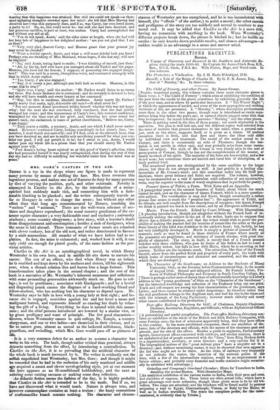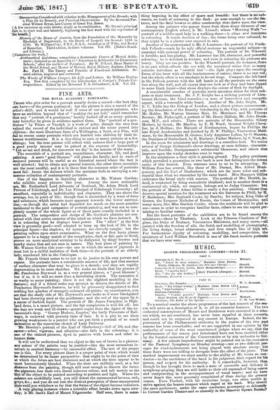PUBLICATIONS RECEIVED.
BOOKS.
A Voyage of Discovery and Research is the Southern and Antarctic Re- gions, during the years 1839-43. By Captain Sir James Clark Ross, R.N. Knt, D.C.L. Oxon, F.R.S. &c. With Plates, Maps, and Wood-cuts. In two volumes.
The Protector; a Vindication. By J. H. Merle D'Aubigne, D.D.
Russell; a Tale of the Reign of Charles IL By G. P. It. James, Esq., Au- thor of " Darnley," &c. In three volumes.
The Child of Poverty, and other Poems. By James Crease. [Besides occasional poems, this volume contains three more elaborate pieces in blank verse. 1. " The Child of Poverty "; which aims at exhibiting the condition of the poor from the cradle to the grave, sometimes by exhibiting generally the life of the poor man, and at others by particular instances. 2. " The Winter Night"- in which the appearances of nature, and some of the more appropriate and staking incidents of life, are presented. 3. "Morning "; where description predominates more than in the other two poems, though man is introduced as rustic occu- pations bring him before the poet's eye, or natural objects suggest some hint that may be improved: for moral reflection pervades " Morning " and the other pieces..
There is nothing novel in the idea of these poems; nor much originality in the execution. The plan is well laid oat, and the different topics well selected from the mass of matters that present themselves to the mind, when a general sub- ject, such as the above, suggests itself, or is given as a theme. Of poetical invention there is little, and that here and there; the ideas only differ by individual view and treatment. The model of the author seems to be Cowper, and there is occasionally an echo of Thomson; though the imi- tation is not servile in either case, and may probably arise from some resem- blance of subject. The style of Mr. Crease is very closely akin to the sort of prose-poetry of Cowper, though he has not the comprehension of his master, or nearly so much of his spirit The majority of his lines are less weighty, ands few do not scan; but sometimes there are smooth and rural bits of description, of a truly poetical kind.
The occasional poems are distinguished by the same qualities as the larger pieces.; but they do not always tell so well. A just gravity is a leading cha- racteristic of Mr. Crease's mind; and this somewhat unfits him fir brief pro- ductions, where great delicacy and finish are required. The volume, howeve may be recommended as a real if somewhat solid collection of not unattractive verse, very far superior to the mass of wordy emptiness that is put forth for poetry.] Pomare Queen of Tahiti; a Poem. With Notes and an Appendix. [A panegyrical poem on the natural beauties of Tahiti, about which too much cannot be said, and on the character of Queen Pomare, which is a more question- able subject. The versification is easy and fluent, though occasionally a rather prosaic line seems to mark the " prentice han'": the appearance of Tahiti, and its climate, are well caught from the descriptions of voyagers; but Queen Pomari we think is painted too much in rose colour, and by an European enthusiasm.] ' Marie. From the French. Edited by Count D'Orsay. With Illustrations.
[A i
pleasing introduction, though not altogether without the French fault of oc- casionally sinking the subject in the art of the writer, leads one to suppose that Marie has a didactic purpose, and that the writer would wish to prove the poste sibility of making the peasant feel the beauties of nature like the artist or the poet. Some theory of this kind was doubtless in the author's head; but, luckily, he has not very intelligibly developed it Marie is simply a picture of peasant life and manners, such as may be found in those districts of France where nearly all the peasantry are proprietors, and strictness of morals obtains, with great sim- plicity of character. The story, in itself, is merely that of a French peasant widower with three children, who goes by desire of his father-in-law to court a rather wealthy widow, but falls in love with Marie, whom he is escorting on her journey. Neither are the incidents much. The attraction, like that of the French theatre, arises from the perfect finish and propriety of every part, the truth with which traits of circumstances and chaiacter are conceived, and the skill with which they are developed.] The Character of the Gentleman; an Address to the- Students of Miami University, Ohio, on the-Evening before Commencement Day, in the month
of August 1846. Second and enlarged' edition. By Francis Lieber, Pro-
fessor of Political Philosophy and Economy in South Carolina College, &c. [There is perhaps rather more of theory than of refined worldly knowledge in Lieber'e address to the "young gentlemen "of Ohio on the "Character of the Gentleman"; but the historical knowledge and reflection of the Professor bring out one point. Truth and self-respect are among the first characteristics of the gentleman, says Lieber, and these cannot be attained under despotisms: he therefore infers that the real gentleman belongs to the Anglican race, and had his rise in the times and with the triumph of the Long Parliament; however much chiialry and many other causes contributed to his production.] Post-office Railway Directory for 1847, of Chairmen, Deputy-Chairmen, Directors, Secretaries, Engineers, and Officials; with an Alphabetical Official Directory. [A painstaking and useful compilation. The Post-ece Railway Direolory con- tains an exhibition of the whole of the British and Irish Railway Companies, with some Foreign ones; the test of admission apparently being, that they have offices in this country. In the more established companies, there are statistics of dis- tance, lists of the directors and officials, with the names of the chairmen past and present, and the site of the offices. Besides a guide to engineers, Parliamentary agents, Government offices connected with railways, and similar matters, there is an alphabetical list of people connected with the "lines," from King Hudson down to a superintendent, secretary, or mere director: and a very curious list it ii. The biographical notices of the "great railway guns" have a singular air in a directory; and, without mentioning names, it may be observed that men appear in the list who ought not to be there. As the titles of railways very frequently do not indicate the routes, the insertion of the extreme points of the lines, with a few of the intermediate stations, would be an improvement in a future edition ; and probably some financial and traffic statistics might occasion- ally he exhibited with advantage.] Grindley and Company's Overland Circular: Hints for Travellers to India, detailing the several Routes. With illustrative Maps. • [An analytical exhibition of the various routes to India, with their pros and cons, and statistics of expense, &c. These latter are often actual bills; which have a great advantage over mere estimates, though those given seem to be by old tra- vellers. Two maps are attached; and the brochure will be found useful to persons proposing a tour to Egypt, Constantinople, Vienna, or Italy by the Rhine, as wall as to Indian. travellers. The route ihe compilers prefer, for the unen- cumbered, is evidently that by Tritate.] Sftimmering Considered with relation to the Management of the Breath; with a Plan for its Remedy, and Practical Observations. By the Reverend Per- cival Wilmot Bryan, late Curate of Great Tey, Essex. [A few exercises on some letters, singly or in combination. Mr. Bryan's principal rule is, to start well and leisurely, beginning the first word with the expiration of the breath.] -History of the House of Austria, from the Foundation of the Monarchy by Rbodolph of Hapsbnrgh, to the Death of Leopold the Second : 1218 to 1792. By William Coxe, F.R.S , F.A.S., Archdeacon of Wilts, and Rector of Bemerton. Third edition, in three volumes. Vol. III. (Bohn's Stand- ard Library.)
[Completes the work.]
Arithmetical Questions; comprising a Systematic Course of Mental Arith- metic; designed as an Appendix to Exercises in Arithmetic for Elementary Schools," after the method of Pestalozzi. By IV. M`Leod, Head Master of the Model School, and Master of Method, Royal Military Asylum, Chelsea, &c. Part IL The Theory and Practice of Fractional Arithmetic. Se- cond edition, improved and corrected.
The Works of William Cowper, his Life and Letters. By William Hayley, Esq. Now first completed by the introduction of Cowper's Private Cor- respondence. Edited by the Reverend T. S. Grimshawe, A.M. Vol.



























 Previous page
Previous page